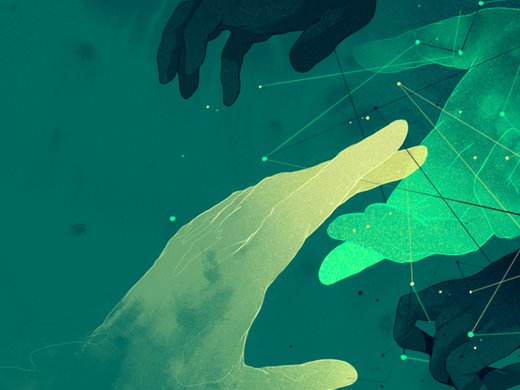Back in the fall of 2021, when I began brainstorming potential subjects to write about for CIGI on digital governance, different conceptions of freedom — as in internet freedom — were near the top of the list.
In recent weeks, many people have been occupied by conceptions, or misconceptions, of freedom. In Ottawa, Canada’s capital city, anti-government demonstrators “terrorized” residents, harassing them and forcing businesses to close, all in the name of a very selective and self-serving idea of “freedom.” As Slate journalist and former Ottawan Dahlia Lithwick remarked, the demonstrators “continued to insist that they were simply cheerful, festive and joyous,” even as they continued to blare their horns, even “as stories emerged of locals who were unable to work, unable to sleep, of children traumatized by the noise.” To the end, these miscreants celebrated their freedom to do whatever they wanted by trampling on the freedom of Ottawans merely to go about their lives.
Not a week after the occupation ended, these anti-government occupiers, ostensibly seeking freedom from having to wear a mask or get a life-saving vaccine, were put to shame by Ukrainians’ fierce defence of their country from an unprovoked Russian invasion on February 24. As I write this, the entire world has been mesmerized by millions of Ukrainians willingly putting their lives on the line in the name of Ukrainian independence.
One of the things that makes invasions so morally offensive is that they involve the domination of one group by another via acts of arbitrary power.
This type of domination isn’t just restricted to large-scale attacks. We’ve all experienced the horrible feeling of being dominated by others, of power being exercised on us for no just reason. Whether it’s an unfair teacher or boss, or an airport security guard forcing you to remove your belt and shoes in an act of security theatre, we know how small and powerless it makes us feel. And to be sure, when someone sends you a death threat online, that’s a form of domination.
We don’t tend to think about freedom — in internet governance, or generally — as freedom from non-domination. Rather, we tend to think about freedom as an individual freedom to do what we want, the freedom of choice. Liberal or libertarian freedom, in other words.
Freedom, Brittle and Robust
However, as criminologist John Braithwaite points out in his just-published book Macrocriminology and Freedom (open access), it’s far more useful to think about freedom in terms of non-domination than in terms of the “brittle” liberal perspective. In the context of digital governance, this approach can also provide us with a means to break through a logjam that tends to turn all internet-governance debates into zero-sum ideological conflicts pitting free speech against tyranny.
Braithwaite has been thinking about the issue of freedom as non-domination for a very long time. Over a career that spans 40 years, he has become a foundational figure, not just in criminology, but in the social sciences generally. Braithwaite, with Peter Drahos, literally wrote the book on global regulatory governance and is a pioneer in the area of restorative justice. In his latest book, he argues that understanding freedom as non-domination is the key to building a more just society.
Freedom from non-domination is also known as “republican freedom,” or “freedom from being enslaved or dominated by arbitrary power.” (Just to be clear, republican freedom is not related at all to the quasi-authoritarian American political party.) Republican freedom can be contrasted with “freedom of choice,” in the traditional liberal or libertarian sense.
In the republican conception of freedom, individual freedom can only be exercised when one is free from domination. Simply focusing on individual freedom will not be enough to deliver the freedom necessary to have a peaceful, democratic society. Individual freedom doesn’t mean much if you aren’t in a position to enjoy this freedom.
As a result, a republican approach to freedom requires that we work, not to increase individual freedoms as an end in itself (although individual freedom is certainly important), but to create the conditions needed to realize this freedom.
Unjust power is arbitrary and increases situations of domination, while just power is designed to increase non-domination.
Delivering Nuance
Understanding freedom as non-domination can inject some much-needed nuance into our discussions, not just about social media governance, but about governance generally.
For one thing, it reframes the end goal of freedom. As Braithwaite notes, “liberal freedom” — the kind that internet-freedom activists so passionately pursue — is conceived as “non-interference in the choices of others.” In contrast, for “the republican, the opposite of freedom is not interference, but slavery or arbitrary imposition of power” (emphasis added).
In other words, when it comes to rules and power, the problem isn’t setting rules in and of themselves, but the nature of that power and how it’s used. After all, society is constituted by rules, which almost by definition restrict choice in some ways. Unjust power is arbitrary and increases situations of domination, while just power is designed to increase non-domination.
Adopting a perspective of freedom as non-domination also offers us a useful way to move past some seemingly intractable problems when it comes to issues such as social-media regulation.
Consider the issue of online harms. Even the most ideological internet-freedom activist would likely concede that social media platforms, as currently constituted, generate some pretty awful behaviour that can hurt individuals and even destabilize communities.
But what to do about it?
Government regulation to deal with online harms is one obvious answer. However, mainstream critiques of government regulation raise concerns, rooted in a respect for individual freedoms (in the liberal/libertarian sense), about the effects of regulation on individual freedom of expression. They tend to express fears of how these government powers will be used in the future. If taking some steps to reduce harm is good, then why not do even more to reduce more harm? If getting rid of misogynist speech only is a good thing (spoiler: yes, it would be), why not keep restricting other speech that is harmful?
A proponent of republican freedom would agree with a libertarian critique of government overreach, not because it would reduce individual liberty, but because it would represent a form of unjust domination. As Braithwaite says, “The answer is clear for the republican that such an insatiable police state would be a profound danger to freedom. It would be the dystopia, the unfreedom, the domination of George Orwell’s ‘Big Brother.’ The dangers of such a dystopia are clear in the minds of voters in all democracies.”
The police state needed to reduce harms to zero would, in other words, lead to unjust tyranny and domination.
While this conclusion might seem to support the “hands off our internet” argument, this argument works both ways. The state isn’t the only part of society capable of domination. As we have learned at great cost, unfettered free expression itself can limit individuals’ ability to participate in public life and lead to situations of domination. According to an Angus Reid survey cited by a recent Royal Society of Canada report on the harassment of experts, “more than six-in-ten Canadians say they have self-censored online in hopes of avoiding … abuse.” It’s the constant harassment, death and rape threats and the potential for them that restrain many from sharing their voice.
Be it the mob, bullies or the state behind the abuse, the result is the same: censorship and unjust domination.
It’s domination, not the state or the market, that’s the problem.
Muddled Discourse
The internet-governance discourse tends to be centred on a liberal reading of individual freedoms. As a result, our internet-governance discourse is sadly muddled. We want to address harms, but we also don’t want to unnecessarily reduce individual freedoms. The problem is, when the protection of individual freedoms is taken as the baseline in this debate, any attempts to address online harms will be interpreted as an attack on individual freedoms.
Considering these issues in terms of individual freedoms tends to privilege those who already are exercising their freedom over those who are excluded from the conversation because of the unjust domination being exercised by current freedom-holders. The resulting reforms will likely privilege the status quo at the expense of those who are currently being harmed by the existing regulatory regime.
Pursuing Non-domination in Internet Governance
As this brief overview suggests, both the overzealous pursuit of harm reduction and the singular commitment to free expression can actually reduce the condition of non-domination that is needed for individuals to be fully free.
Seeing freedom as the state of non-domination requires that we ask not “How can we maximize individual freedom?” but instead “What actions can institutions take in order to minimize or eliminate domination?”
Republican freedom does not dismiss the importance of individual freedom of choice. Instead, it places this individual freedom in a wider context of non-domination. This is the limiting rule: the limits of individual freedom, and of harm reduction, should occur when their expansion no longer contributes to reduced domination, but causes increased, and unjust, domination.
Thinking about social media regulation in this way forces us to consider equally not only the effects of regulation on future hypothetical effects on freedom of expression, but also on injustices being experienced by actual people. By pulling the focus away from speech and toward domination, we are compelled to address situations in which individual freedom of choice (say, to harass someone online) contributes to domination.
This also expands the focus on rights beyond a narrow emphasis on free expression, while it also considers the potential for unjust state domination. From this approach, it becomes much more difficult to stop with “Support the free and open internet” in the name of freedom of expression, because the free and open internet as it currently exists is contributing to unjust domination.
Pursuing non-domination is not supposed to be easy. It’s an invitation to complex discussions about what constitutes just and unjust domination, and the weighing of costs and benefits. Needless to say, opinions will differ on all of these points. But these issues are complex: they should inspire thoughtful reflection, not sloganeering. From this perspective, the pursuit of the goal of non-domination is most helpful, because it is satiable. It focuses our attention on the correct objective.
A socialist view advocates the weakening of the market in favour of the state. In contrast, the republican-freedom view argues in favour of strengthening all institutions to serve as checks on each other.
Building Up (Democratic) Institutions
Realizing republic freedom requires paying attention to the institutions — the norms makers and rulemakers that shape society. Freedom, argues Braithwaite, cannot be delivered by the state alone. Nor can it be entrusted to the market, or to civil society.
Again, it comes back to the need to avoid domination. If any one of these institutions is too strong, domination — arbitrary expressions of power — will almost certainly ensue. As a result, republican freedom requires the existence of strong institutions that can serve as counterbalances, lest one gets the upper hand on the others and acts in a dominating manner.
(Here, I should note that civil society acts more as an influence on the state and on companies than as a potentially dominating force in its own right. A healthy civil society is one that is somewhat representative of the polity and can influence decisions.)
The republican call for strong institutions stands at odds with the usual ideological approaches we see in internet governance, and generally. Libertarians — active and vocal participants in this debate — argue for the weakening of the state in favour of the market. A socialist view advocates the weakening of the market in favour of the state. In contrast, the republican-freedom view argues in favour of strengthening all institutions to serve as checks on each other.
From a republican perspective, a strong state is an essential component in realizing a project of non-domination. However, it must be tempered not only by the counterbalance of the market and civil society. Republican thought places great importance on democracy as a means to keep state power in line, in order to prevent tyranny.
In short, freedom from non-domination requires that we strengthen both states and markets, while ensuring a healthy civil society.
Today’s Dilemma: Dysfunctional Markets, Weak State
Considered from a republican-freedom perspective, there is little encouraging about the current state of internet or digital governance.
The market is dominated by monopolies that are barely accountable to the publics they serve, and capable of exercising significant capricious power. These monopolies, notes Braithwaite, have created a “market in vice sustained by monopolies in breach of antitrust laws that have the overarching objective of keeping us glued to the screen controlled by their platform so they can sell more advertising. The market in the vices of artificial intelligence (AI) has trained their platforms to understand that provocative lies are better than truths for eliciting clicks.” None of this is particularly healthy.
The state, meanwhile, at least in Canada, has been hollowed out over 40 years, the victim of an ideology that sees government as the problem, rather than as a necessary pillar in society. Instead of asking “How can government best regulate?” a substantial part of Canadian society is still asking “Should the government regulate?”
To its capacity woes we can add a reluctance by the government to engage in substantive consultations on its online harms proposal, which it presented as a fait accompli in July 2021. On the plus side, the introduction of a legislative and regulatory framework would introduce democratically legitimate oversight to a sector where self-regulation has largely been the rule. This type of regulation, on its own, would reduce the ability of companies to exercise arbitrary power.
However, on the minus side, this lack of consultation suggests a relative lack of attention to the iterative consultations that characterize a healthy democracy and makes for sound policy.
What to Do
Faced with a problem of domination caused by the lack of regulation of self-interested, profit-motivated online companies, the republican remedy calls for both government and the market to be strengthened. On the market side, greater competition is needed. However, greater competition alone won’t solve things. Greater attention to and regulation of what the market produces is also needed. As Braithwaite notes, “Competition policy in societies with neoliberal ideologies can drive markets to the ever more efficient production of goods, yet doing so inevitably also induces the more efficient production of ‘bads’.” A just society is one that minimizes the production of bads.
On the question of state regulation, this requires that we accept that the government — as the most democratic institution in society — has a central role to play in minimizing domination. The state must become more active in regulating than it has been, including on the question of how to encourage those activities that lead to reduced states of domination. To that end, the 2021 report from the Women’s Legal Education & Action Fund, Deplatforming Misogyny, offers a proposal to deal with online harms that reflects in many ways a view of freedom as non-domination. However, greater government activity must be combined with, at the least, meaningful, effective consultations of the kind that we really haven’t seen much of in Canada on these issues.
Which brings us, in a sense, back to the beginning. The virtue of a republican approach to freedom is that it recognizes that justice is constitutive of individual freedom. You can’t act as a free person and exercise freedom of choice under conditions of domination. It’s hard to freely express yourself over the incessant blare of a truck horn, or under an avalanche of online harassment.
Domination can happen online or offline, via the law or the marketplace. Individual freedom that contributes to the domination of others is inherently unjust. Individual freedom can only be justified to the extent that it improves non-domination. And so, we have to always ask ourselves: Are our policies conducive to reducing domination?
Understanding freedom as non-domination doesn’t make regulation easier. It does, however, provide us with a clearer, more tractable target. Unlike a singular focus on a brittle idea of individual freedom, republican freedom combines freedom with justice in a way that can actually make everyone better off, and, indeed, freer.



